武大博士英语 第一课摘要
- 格式:doc
- 大小:27.00 KB
- 文档页数:1
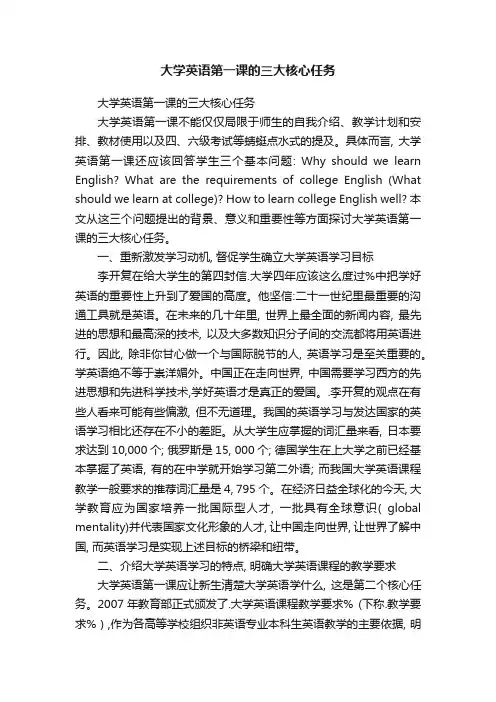
大学英语第一课的三大核心任务大学英语第一课的三大核心任务大学英语第一课不能仅仅局限于师生的自我介绍、教学计划和安排、教材使用以及四、六级考试等蜻蜓点水式的提及。
具体而言, 大学英语第一课还应该回答学生三个基本问题: Why should we learn English? What are the requirements of college English (What should we learn at college)? How to learn college English well? 本文从这三个问题提出的背景、意义和重要性等方面探讨大学英语第一课的三大核心任务。
一、重新激发学习动机, 督促学生确立大学英语学习目标李开复在给大学生的第四封信.大学四年应该这么度过%中把学好英语的重要性上升到了爱国的高度。
他坚信:二十一世纪里最重要的沟通工具就是英语。
在未来的几十年里, 世界上最全面的新闻内容, 最先进的思想和最高深的技术, 以及大多数知识分子间的交流都将用英语进行。
因此, 除非你甘心做一个与国际脱节的人, 英语学习是至关重要的。
学英语绝不等于崇洋媚外。
中国正在走向世界, 中国需要学习西方的先进思想和先进科学技术,学好英语才是真正的爱国。
.李开复的观点在有些人看来可能有些偏激, 但不无道理。
我国的英语学习与发达国家的英语学习相比还存在不小的差距。
从大学生应掌握的词汇量来看, 日本要求达到10,000个; 俄罗斯是15, 000个; 德国学生在上大学之前已经基本掌握了英语, 有的在中学就开始学习第二外语; 而我国大学英语课程教学一般要求的推荐词汇量是4, 795个。
在经济日益全球化的今天, 大学教育应为国家培养一批国际型人才, 一批具有全球意识( global mentality)并代表国家文化形象的人才, 让中国走向世界, 让世界了解中国, 而英语学习是实现上述目标的桥梁和纽带。
二、介绍大学英语学习的特点, 明确大学英语课程的教学要求大学英语第一课应让新生清楚大学英语学什么, 这是第二个核心任务。
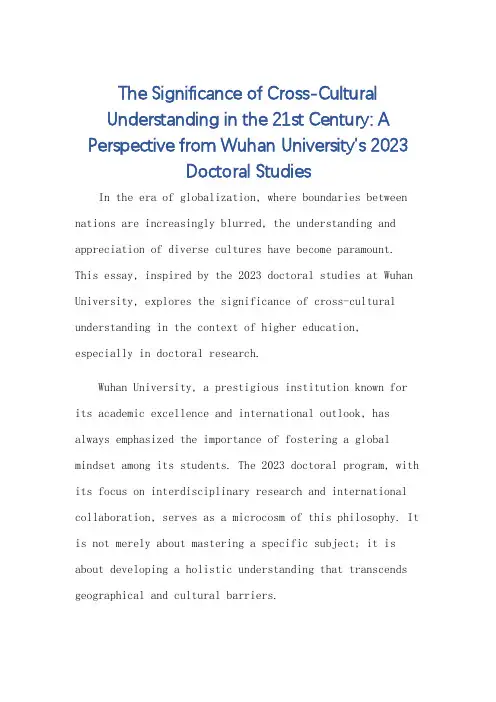
The Significance of Cross-CulturalUnderstanding in the 21st Century: A Perspective from Wuhan University's 2023Doctoral StudiesIn the era of globalization, where boundaries between nations are increasingly blurred, the understanding and appreciation of diverse cultures have become paramount. This essay, inspired by the 2023 doctoral studies at Wuhan University, explores the significance of cross-cultural understanding in the context of higher education,especially in doctoral research.Wuhan University, a prestigious institution known for its academic excellence and international outlook, has always emphasized the importance of fostering a global mindset among its students. The 2023 doctoral program, with its focus on interdisciplinary research and international collaboration, serves as a microcosm of this philosophy. It is not merely about mastering a specific subject; it is about developing a holistic understanding that transcends geographical and cultural barriers.The 21st-century academia is characterized by collaborative research, where scholars from different parts of the world come together to solve complex problems. This necessitates a deep understanding of not just thescientific theories but also the cultural nuances thatshape perspectives. Doctoral candidates at Wuhan University, therefore, are encouraged to engage in cross-cultural dialogue, understanding that cultural sensitivity can significantly enhance the quality and relevance of their research.For instance, a study on climate change, a global issue, would benefit greatly from a cross-cultural perspective. Researchers from different cultural backgrounds bringunique insights, shaped by their local experiences and historical contexts. This diversity enriches the discourse, leading to more comprehensive and inclusive solutions. Similarly, a doctoral study on healthcare policies could gain depth by considering how cultural beliefs influence health practices and perceptions.Moreover, cross-cultural understanding fosters empathy, respect, and tolerance, essential traits for future leadersand scholars. It equips them to navigate the complexities of an interconnected world, enhancing their ability to communicate effectively, build partnerships, and lead in a multicultural environment. As Wuhan University's 2023 doctoral cohort embarks on their academic journey, they are not only equipped with academic knowledge but also with a global perspective that will undoubtedly contribute totheir personal and professional growth.In conclusion, the 2023 doctoral program at Wuhan University underscores the vital role of cross-cultural understanding in shaping the future of academia. It is not just about broadening horizons; it is about cultivating a new breed of scholars who can bridge gaps, facilitate global cooperation, and drive innovation. As the world becomes increasingly interconnected, the lessons learned within the halls of Wuhan University will resonate far beyond its campus, shaping a more inclusive and understanding global community.This essay, while rooted in the context of Wuhan University's 2023 doctoral studies, serves as a broader commentary on the importance of cross-culturalunderstanding in higher education. It is a call to embrace diversity, foster dialogue, and nurture a new generation of scholars who are not just knowledgeable but culturally sensitive and globally aware.。

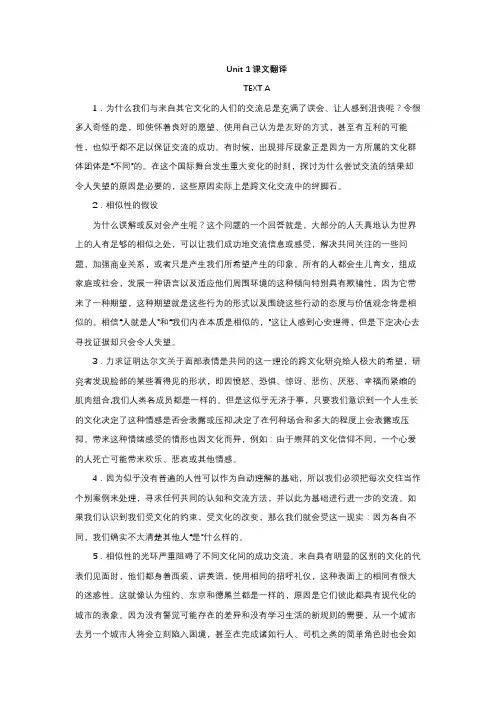
Unit 1课文翻译TEXT A1.为什么我们与来自其它文化的人们的交流总是充满了误会、让人感到沮丧呢?令很多人奇怪的是,即使怀着良好的愿望、使用自己认为是友好的方式,甚至有互利的可能性,也似乎都不足以保证交流的成功。
有时候,出现排斥现象正是因为一方所属的文化群体团体是“不同”的。
在这个国际舞台发生重大变化的时刻,探讨为什么尝试交流的结果却令人失望的原因是必要的,这些原因实际上是跨文化交流中的绊脚石。
2.相似性的假设为什么误解或反对会产生呢?这个问题的一个回答就是,大部分的人天真地认为世界上的人有足够的相似之处,可以让我们成功地交流信息或感受,解决共同关注的一些问题,加强商业关系,或者只是产生我们所希望产生的印象。
所有的人都会生儿育女,组成家庭或社会,发展一种语言以及适应他们周围环境的这种倾向特别具有欺骗性,因为它带来了一种期望,这种期望就是这些行为的形式以及围绕这些行动的态度与价值观念将是相似的。
相信“人就是人”和“我们内在本质是相似的,”这让人感到心安理得,但是下定决心去寻找证据却只会令人失望。
3.力求证明达尔文关于面部表情是共同的这一理论的跨文化研究给人极大的希望,研究者发现脸部的某些看得见的形状,即因愤怒、恐惧、惊讶、悲伤、厌恶、幸福而紧缩的肌肉组合,我们人类各成员都是一样的。
但是这似乎无济于事,只要我们意识到一个人生长的文化决定了这种情感是否会表露或压抑,决定了在何种场合和多大的程度上会表露或压抑。
带来这种情绪感受的情形也因文化而异,例如:由于崇拜的文化信仰不同,一个心爱的人死亡可能带来欢乐、悲哀或其他情感。
4.因为似乎没有普遍的人性可以作为自动理解的基础,所以我们必须把每次交往当作个别案例来处理,寻求任何共同的认知和交流方法,并以此为基础进行进一步的交流。
如果我们认识到我们受文化的约束,受文化的改变,那么我们就会受这一现实:因为各自不同,我们确实不太清楚其他人“是”什么样的。
5.相似性的光环严重阻碍了不同文化间的成功交流。
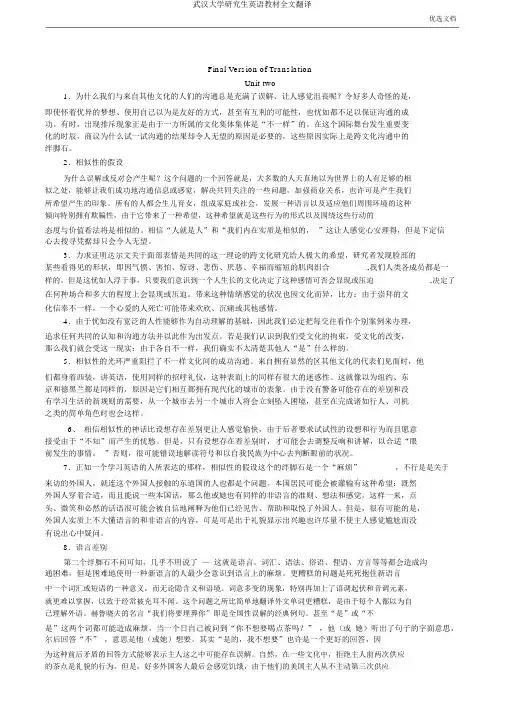
武汉大学研究生英语教材全文翻译优选文档Final Version of TranslationUnit two1.为什么我们与来自其他文化的人们的沟通总是充满了误解、让人感觉沮丧呢?令好多人奇怪的是,即使怀着优异的梦想、使用自己以为是友好的方式,甚至有互利的可能性,也忧如都不足以保证沟通的成功。
有时,出现排斥现象正是由于一方所属的文化集体集体是“不一样”的。
在这个国际舞台发生重要变化的时辰,商议为什么试一试沟通的结果却令人无望的原因是必要的,这些原因实际上是跨文化沟通中的绊脚石。
2.相似性的假设为什么误解或反对会产生呢?这个问题的一个回答就是,大多数的人天真地以为世界上的人有足够的相似之处,能够让我们成功地沟通信息或感觉,解决共同关注的一些问题,加强商业关系,也许可是产生我们所希望产生的印象。
所有的人都会生儿育女,组成家庭或社会,发展一种语言以及适应他们周围环境的这种倾向特别拥有欺骗性,由于它带来了一种希望,这种希望就是这些行为的形式以及围绕这些行动的态度与价值看法将是相似的。
相信“人就是人”和“我们内在实质是相似的,”这让人感觉心安理得,但是下定信心去搜寻凭据却只会令人无望。
3.力求证明达尔文关于面部表情是共同的这一理论的跨文化研究给人极大的希望,研究者发现脸部的某些看得见的形状,即因气愤、害怕、惊讶、悲伤、厌恶、幸福而缩短的肌肉组合,我们人类各成员都是一样的。
但是这忧如人浮于事,只要我们意识到一个人生长的文化决定了这种感情可否会显现或压迫,决定了在何种场合和多大的程度上会显现或压迫。
带来这种情绪感觉的状况也因文化而异,比方:由于崇拜的文化信奉不一样,一个心爱的人死亡可能带来欢欣、沉痛或其他感情。
4.由于忧如没有宽泛的人性能够作为自动理解的基础,因此我们必定把每交往看作个别案例来办理,追求任何共同的认知和沟通方法并以此作为出发点。
若是我们认识到我们受文化的拘束,受文化的改变,那么我们就会受这一现实:由于各自不一样,我们确实不太清楚其他人“是”什么样的。
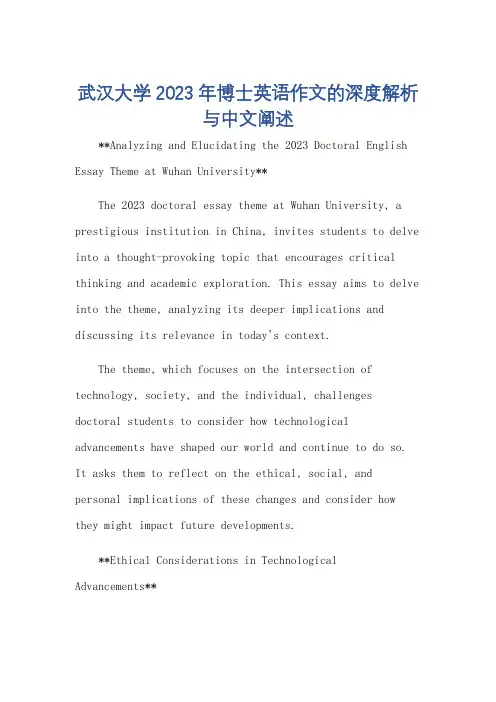
武汉大学2023年博士英语作文的深度解析与中文阐述**Analyzing and Elucidating the 2023 Doctoral English Essay Theme at Wuhan University**The 2023 doctoral essay theme at Wuhan University, a prestigious institution in China, invites students to delve into a thought-provoking topic that encourages critical thinking and academic exploration. This essay aims to delve into the theme, analyzing its deeper implications and discussing its relevance in today's context.The theme, which focuses on the intersection of technology, society, and the individual, challenges doctoral students to consider how technological advancements have shaped our world and continue to do so. It asks them to reflect on the ethical, social, and personal implications of these changes and consider how they might impact future developments.**Ethical Considerations in Technological Advancements**One significant aspect of the theme is the ethical considerations that arise with technological advancements. As we witness rapid advancements in areas like artificial intelligence, biotechnology, and data analytics, it becomes crucial to consider the ethical implications of these technologies. For instance, how do we ensure that AI systems are designed and used ethically, without discriminating against certain groups or infringing on individual privacy? How do we ensure that biotechnology is used responsibly, without creating potential harm to human health or the environment? These are questions thatdoctoral students must grapple with as they delve into the ethical dimensions of technology.**Social Impacts of Technological Change**Another important aspect of the theme is the social impacts of technological change. Technology has thepotential to disrupt existing social structures and create new ones. It can change the way we interact with each other, the way we work, and the way we live. Doctoral students are encouraged to consider how these changes might affectsociety at large, including issues of social inequality,access to technology, and the role of technology in promoting or hindering social progress.**Personal Dimensions of Technological Change**Finally, the theme also considers the personal dimensions of technological change. Technology has becomean integral part of our lives, shaping our identities, beliefs, and values. Doctoral students are challenged to reflect on how technological advancements have impactedtheir own lives and the lives of others, and to considerhow they might shape their future careers and personal growth.**中文阐述**武汉大学2023年博士英语作文的主题邀请学生们深入探讨科技与社会的交织关系,以及科技如何塑造我们的世界。
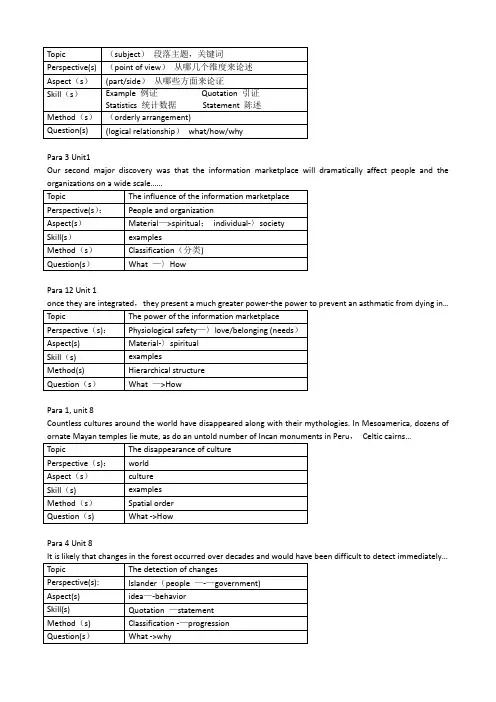
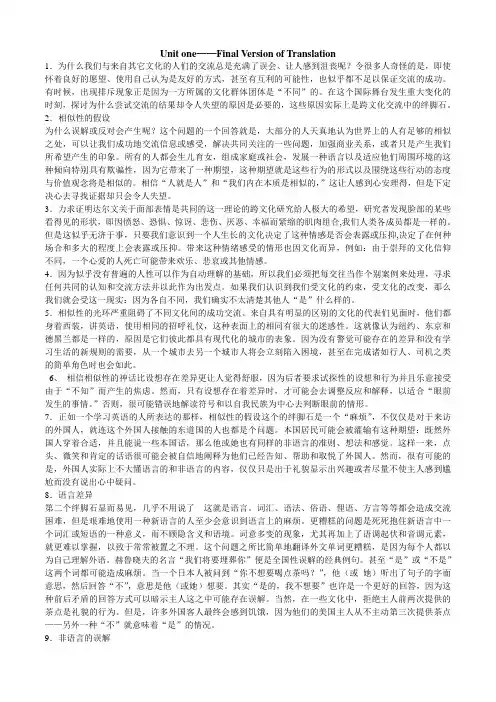
Unit one——Final Version of Translation1.为什么我们与来自其它文化的人们的交流总是充满了误会、让人感到沮丧呢?令很多人奇怪的是,即使怀着良好的愿望、使用自己认为是友好的方式,甚至有互利的可能性,也似乎都不足以保证交流的成功。
有时候,出现排斥现象正是因为一方所属的文化群体团体是“不同”的。
在这个国际舞台发生重大变化的时刻,探讨为什么尝试交流的结果却令人失望的原因是必要的,这些原因实际上是跨文化交流中的绊脚石。
2.相似性的假设为什么误解或反对会产生呢?这个问题的一个回答就是,大部分的人天真地认为世界上的人有足够的相似之处,可以让我们成功地交流信息或感受,解决共同关注的一些问题,加强商业关系,或者只是产生我们所希望产生的印象。
所有的人都会生儿育女,组成家庭或社会,发展一种语言以及适应他们周围环境的这种倾向特别具有欺骗性,因为它带来了一种期望,这种期望就是这些行为的形式以及围绕这些行动的态度与价值观念将是相似的。
相信“人就是人”和“我们内在本质是相似的,”这让人感到心安理得,但是下定决心去寻找证据却只会令人失望。
3.力求证明达尔文关于面部表情是共同的这一理论的跨文化研究给人极大的希望,研究者发现脸部的某些看得见的形状,即因愤怒、恐惧、惊讶、悲伤、厌恶、幸福而紧缩的肌肉组合,我们人类各成员都是一样的。
但是这似乎无济于事,只要我们意识到一个人生长的文化决定了这种情感是否会表露或压抑,决定了在何种场合和多大的程度上会表露或压抑。
带来这种情绪感受的情形也因文化而异,例如:由于崇拜的文化信仰不同,一个心爱的人死亡可能带来欢乐、悲哀或其他情感。
4.因为似乎没有普遍的人性可以作为自动理解的基础,所以我们必须把每交往当作个别案例来处理,寻求任何共同的认知和交流方法并以此作为出发点。
如果我们认识到我们受文化的约束,受文化的改变,那么我们就会受这一现实:因为各自不同,我们确实不太清楚其他人“是”什么样的。
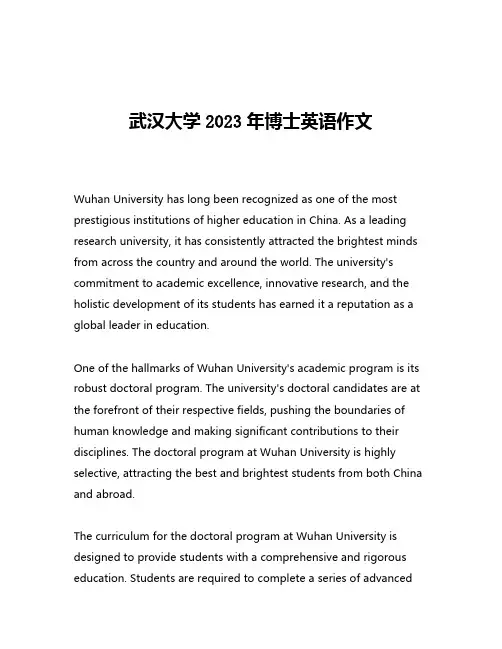
武汉大学2023年博士英语作文Wuhan University has long been recognized as one of the most prestigious institutions of higher education in China. As a leading research university, it has consistently attracted the brightest minds from across the country and around the world. The university's commitment to academic excellence, innovative research, and the holistic development of its students has earned it a reputation as a global leader in education.One of the hallmarks of Wuhan University's academic program is its robust doctoral program. The university's doctoral candidates are at the forefront of their respective fields, pushing the boundaries of human knowledge and making significant contributions to their disciplines. The doctoral program at Wuhan University is highly selective, attracting the best and brightest students from both China and abroad.The curriculum for the doctoral program at Wuhan University is designed to provide students with a comprehensive and rigorous education. Students are required to complete a series of advancedcoursework, covering a wide range of topics within their chosen field of study. This coursework is designed to not only deepen their understanding of their subject matter but also to develop their critical thinking, research, and analytical skills.In addition to the coursework, doctoral students at Wuhan University are also required to conduct original research and to produce a dissertation that makes a significant contribution to their field. This research component is a crucial aspect of the doctoral program, as it allows students to delve deeply into a specific area of study and to push the boundaries of human knowledge.One of the key strengths of the doctoral program at Wuhan University is the quality of the faculty. The university has assembled a world-class team of researchers and scholars who are at the forefront of their respective fields. These faculty members are not only highly accomplished in their own right but also deeply committed to the success of their students.The faculty members at Wuhan University provide their doctoral students with individualized guidance and support throughout the research and writing process. They work closely with their students to help them identify research topics, develop research methodologies, and interpret their findings. They also provide valuable feedback and advice to help their students refine their workand ensure that their dissertations are of the highest quality.Another important aspect of the doctoral program at Wuhan University is the emphasis on interdisciplinary collaboration. The university recognizes that many of the most pressing challenges facing the world today require a multidisciplinary approach. As a result, the doctoral program encourages students to engage with scholars and researchers from other disciplines, to explore the intersections between different fields of study, and to develop a more holistic understanding of their research topics.This emphasis on interdisciplinary collaboration is reflected in the university's research centers and institutes, which bring together scholars from a wide range of disciplines to work on cutting-edge research projects. Doctoral students at Wuhan University have the opportunity to participate in these collaborative research initiatives, gaining valuable experience and exposure to a diverse range of perspectives and approaches.In addition to the academic rigor of the doctoral program, Wuhan University also places a strong emphasis on the personal and professional development of its students. The university offers a wide range of support services and resources to help its doctoral students succeed, including career counseling, professional development workshops, and mental health services.The university also encourages its doctoral students to engage in extracurricular activities and to participate in the broader intellectual and cultural life of the campus. This includes opportunities to attend guest lectures, participate in student organizations, and engage in community service projects.Overall, the doctoral program at Wuhan University is a truly exceptional educational experience. The university's commitment to academic excellence, innovative research, and the holistic development of its students has made it a global leader in doctoral education. For those who are fortunate enough to be accepted into the program, the opportunity to study at Wuhan University is a once-in-a-lifetime experience that will undoubtedly shape their academic and professional trajectories for years to come.。
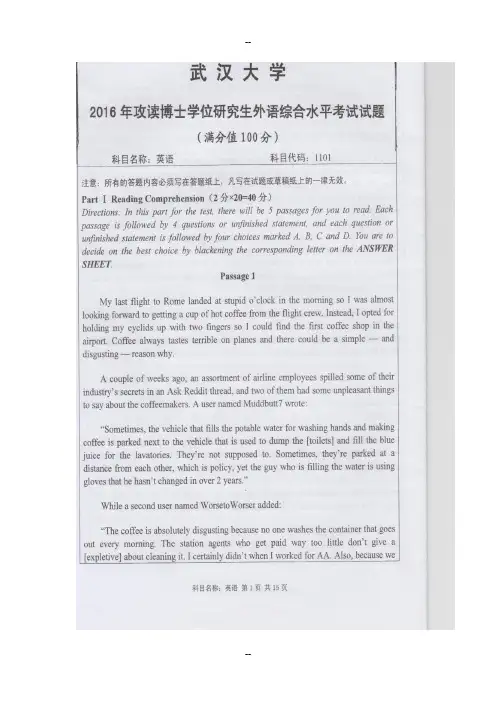
矿产资源开发利用方案编写内容要求及审查大纲
矿产资源开发利用方案编写内容要求及《矿产资源开发利用方案》审查大纲一、概述
㈠矿区位置、隶属关系和企业性质。
如为改扩建矿山, 应说明矿山现状、
特点及存在的主要问题。
㈡编制依据
(1简述项目前期工作进展情况及与有关方面对项目的意向性协议情况。
(2 列出开发利用方案编制所依据的主要基础性资料的名称。
如经储量管理部门认定的矿区地质勘探报告、选矿试验报告、加工利用试验报告、工程地质初评资料、矿区水文资料和供水资料等。
对改、扩建矿山应有生产实际资料, 如矿山总平面现状图、矿床开拓系统图、采场现状图和主要采选设备清单等。
二、矿产品需求现状和预测
㈠该矿产在国内需求情况和市场供应情况
1、矿产品现状及加工利用趋向。
2、国内近、远期的需求量及主要销向预测。
㈡产品价格分析
1、国内矿产品价格现状。
2、矿产品价格稳定性及变化趋势。
三、矿产资源概况
㈠矿区总体概况
1、矿区总体规划情况。
2、矿区矿产资源概况。
3、该设计与矿区总体开发的关系。
㈡该设计项目的资源概况
1、矿床地质及构造特征。
2、矿床开采技术条件及水文地质条件。
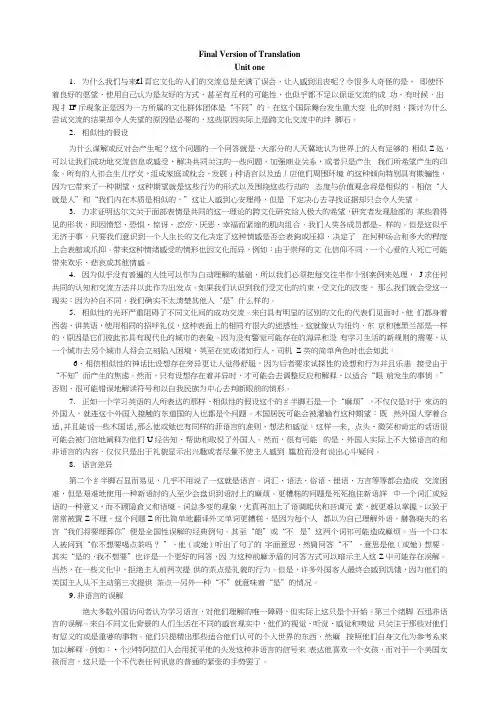
Final Version of TranslationUnit one1.为什么我们与来£l頁它文化的人们的交流总是充满了误会、让人感到沮丧呢?令很多人奇怪的是,即使怀着良好的愿望、使用自己认为是友好的方式,甚至有互利的可能性,也似乎都不足以保证交流的成功。
有时候,出现扌IF斥现彖正是因为一方所属的文化群体团体是“不同”的。
在这个国际舞台发生重大变化的时刻,探讨为什么尝试交流的结果却令人失望的原因是必要的,这些原因实际上是跨文化交流中的绊脚石。
2.相似性的假设为什么谋解或反对会产生呢?这个问题的一个冋答就是,大部分的人天冀地认为世界上的人有足够的相似Z处,可以让我们成功地交流信息或感受,解决共同关注的一些问题,加强商业关系,或者只是产生我们所希望产生的印彖。
所有的人祁会生儿疗女,组成家庭或枕会,发展i种语言以及适丿应他们周围环境的这种倾向特别具有欺骗性,因为它带來了一种期望,这种期望就是这些行为的形式以及围绕这些行动的态度与价值观念将是相似的。
相信“人就是人”和“我们内在木质是相似的,”这让人感到心安理得,但是下定决心去寻找证据却只会令人失望。
3.力求证明达尔文关于面部表情是共同的这一理论的跨文化研究给人极大的希望,硏究者发现脸部的某些看得见的形状,即因愤怒、恐惧、惊讶、恋伤、厌恶、幸福而紧缩的肌肉组合,我们人类各成员都是- 样的。
但是这似乎无济于事,只要我们意识到一个人生长的文化决定了这种情感是否会表鉤或压抑,决定了在何种场合和多大的稈度上会表館或爪抑。
带来这种情绪感受的情形也因文化而异,例如:由于崇拜的文化信仰不同,一个心爱的人死亡可能带来欢乐、悲哀或其他情感。
4.因为似乎没有普遍的人性可以作为白动理解的基础,所以我们必须把每交往半作个别案例来处理,J求任何共同的认知和交流方法并以此作为出发点。
如果我们认识到我们受文化的约束,受文化的改变,那么我们就会受这一现实:因为衿自不同,我们确实不太淸楚其他人“是”什么样的。
武汉大学2023年博士英语作文Studying for a doctoral degree at Wuhan University in 2023 is a dream come true for many students. 正在2023年在武汉大学攻读博士学位对许多学生来说是梦想成真。
The vibrant academic environment, world-class faculty, and state-of-the-art research facilities at Wuhan University provide an excellent platform for pursuing advanced studies. 武汉大学充满活力的学术环境、世界一流的教职员工,以及先进的研究设施为深造提供了绝佳平台。
As a doctoral student, one can delve deep into their field of interest, conduct groundbreaking research, and contribute to the global knowledge pool. 作为博士生,可以深入研究自己感兴趣的领域,进行开创性的研究,为全球知识库做出贡献。
Moreover, the opportunity to collaborate with fellow researchers, attend conferences, and publish in prestigious journals can enhance one's academic and professional profile. 此外,与其他研究人员合作、参加会议以及在知名期刊上发表论文的机会可以提升一个人的学术和专业形象。
The social and cultural experiences in Wuhan, a city rich in history and diversity, can also enrich a doctoral student's personal growth and perspective. 武汉这座历史悠久、多元文化的城市提供了丰富的社会和文化体验,也可以丰富博士生的个人成长和视角。
Computer vulnerabilities are often utilized by hackers or crackers. The security of each computer is challenging.The text mainly focuses on methods hackers attack computers.Initially,the author redefines the term “hacker””cracker”and ”getting inside”a computer.The term “unauthorized user”(UU) will be a better choice for defining the insider group.Known and unknown vulnerabilities will be taken advantage of by UUs ranging from terrible password protection to keeping a computer on,which can be accessible to others in the office.The author then compares two kinds of target systems--strongly protected and weakly protected .For the former ones,a UU should employ low-technology attacks.For the latter ones,a UU can use technical exploits where specifications of the target system must be firstly determined.Additionally,the text introduces two types of attacks--one that a UU makes sure the configuration of a target system through capabilities involved in hypertext transfer protocol(http) and one that is launched without any certain target by preprogramming against specific weakness.Realizing that if the UU’s motivations change the end goal of unauthorized access also varies is significant.At last,the author gives us suggestions to protect computers against attacks,including updating patches,making complicated password,getting a hardware firewall to get information only from websites you need,updating anti-virus software and backing up data.。
Abstract
——Unit One 《What Will Be》
(遥感学院S091班张东映2009202130029)
The author explored many ways which Information Market would affect our society and daily life , so as to indicate the future of the Information Market. When facing the society, the author concluded three discoveries: the first discovery was that this information Marketplace can indeed be built on a technological foundation: the information infrastructure. The second discovery was that the Information Marketplace will dramatically affect people and organizations on a wide scale. Putting all these detailed uses in perspective, it has been realized that they were different faces of two major new forces:electronic bulldozers and electronic proximity. The electronic bulldozers’ effect is primarily economic, increasing human productivity in both our personal lives and the workplace. The third important discovery from these explorations was the power of the Information Marketplace to customize information and information work to different human and organizational needs. The other major force —electronic proximity —will increase by a thousand times the number of people we can easily reach and will bring people together across space and time. However, when facing human emotion and human relationships, the author discovered that they will pass only partially through the Information Marketplace, for many of our most valued actions and decisions involve these forces like trust, love, and fear —the information world will not be a substitute for the physical world. Yet the author saw that we might be able to reduce some of these complexity problems by making the artifacts of the Information Age easier to use —a primary goal for the technologists of the 21th century. At last, it came to a conclusion that the Information Marketplace will transform our society over the next century as significantly as the two industrial revolutions, establishing itself solidly and rightfully as the Third Revolution in modern human history. What’s more, We need not fear it any more or any less than people feared the other revolutions, because it carries similar promises and pitfalls. What we need to do, instead, is to understand it, feel it, and embrace it so as to harness it to steer our future human course.。